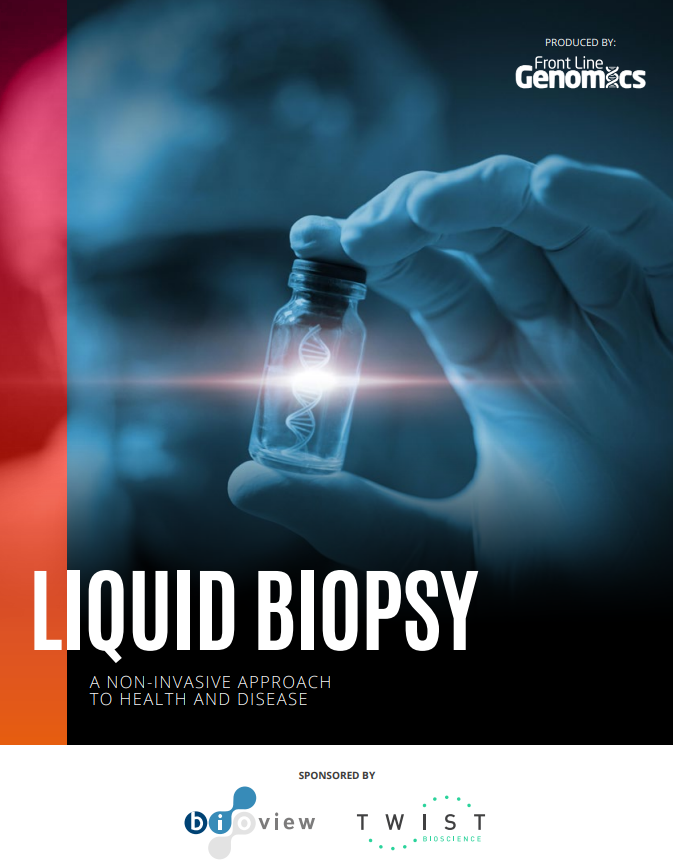
Liquid Biopsy – A Non-Invasive Approach To Health And Disease
The results from liquid biopsy are already beginning to inform clinical practice, while still driving research and innovation. However, invasive biopsies remain the gold standard in the majority of cases. How can liquid biopsy reach its full potential and bring non-invasive diagnosis into widespread clinical use? To address that question and many more, our new report Liquid Biopsy – A Non-Invasive Approach To Health And Disease is available to download for free now.
What’s included in the report?
- Exclusive liquid biopsy insights from expert contributors
- How the progression of liquid biopsy made the field what it is today
- The application of liquid biopsy in cancer and other diseases
- Case studies detailing liquid biopsy in retinoblastoma and non-invasive prenatal testing
- A panel discussion on the current and future status of liquid biopsy in cancer
- Insights into alternative biomarkers and liquids
- An introduction to exhaled breath analysis
- How liquid biopsy can be progressed in the future
Report contributors include:
- Catherine Alix-Panabières, Director of the Laboratory Cellules Circulantes Rares Humaines (LCCRH), University Medical Centre of Montpellier
- Klaus Pantel, Chairman, Institute of Tumour Biology, University Medical Center Hamburg-Eppendorf
- Chris Abbosh, Senior Director, Translational Medicine, AstraZeneca
- Jesse Berry, Director, Vice Chair, MD, Children’s Hospital Los Angeles
- Lauren Leiman, Executive Director, BLOODPAC
- Elin Gray, Associate Professor, Edith Cowan University
- Pamela Pinzani, Associate Professor, University of Florence
- Sven Borchmann, Principal Investigator, University of Cologne
- Jina Ko, Assistant Professor, University of Pennsylvania
- Nikolai Slavov, Associate Professor, Northeastern University
- Billy Boyle, MBE, Founder and CEO, Owlstone Medical
- Holly Leather, PhD Student, The University of Manchester
- Carolin Sauer, Postdoctoral Fellow, EMBL-EBI / CRUK Cambridge Institute (University of Cambridge)
Contents:
Chapter 1: Introduction To Liquid Biopsy
An introduction to liquid biopsy and the concept of minimally invasive diagnosis. This chapter includes a look back at the history of the field, covering how liquid biopsy started and how it has developed into what it is today.
Chapter 2: Cancer And Other Applications
The most common application of liquid biopsy is in the field of cancer diagnostics. Early detection, monitoring and minimal residual disease are covered in the chapter. As liquid biopsy is not just limited to cancer, some alternative applications are also explored.
Chapter 3: Clinical Practice – Are We There Yet?
An update on the clinical liquid biopsy landscape. How many clinical trials are ongoing and which of these are producing promising results? This chapter also includes a panel discussion covering the current state of liquid biopsy and how to address challenges moving forward.
Chapter 4: Extracellular Vesicles And Alternative Biomarkers
Research into extracellular vesicles as circulating biomarkers is rapidly following in the footsteps of circulating tumour cells and DNA. This chapter explores extracellular vesicles and other emerging biomarkers that can be analysed with liquid biopsy.
Chapter 5: Alternative Liquid Biopsies
Blood is the primary liquid analysed in liquid biopsy. However, the human body contains many other fluids that can act as important sources of biomarkers. This chapter explores some of the alternative liquids and how they can be utilised in liquid biopsy.
Chapter 6: Exhaled Breath Analysis
Although not liquid biopsy, this emerging field has similar research aims, themes and concepts as liquid biopsy. This chapter introduces exhaled breath analysis and how this can be used to achieve non-invasive diagnosis.
Chapter 7: Future Perspectives In Liquid Biopsy
Much progress has been made in the field of liquid biopsy, but many challenges still remain. The final chapter of the report explores how the liquid biopsy community are tackling the current issues and how liquid biopsy can be progressed in the future.
Download Report
ABOUT US CONTACT ADVERTISE PRIVACY POLICY
Front Line Genomics Limited is registered in England and Wales. Company Number 10421716, VAT: GB 297 742 548.
Registered Office: Ground Floor, Cromwell House, 15 Andover Road, Winchester, Hampshire, SO23 7BT
